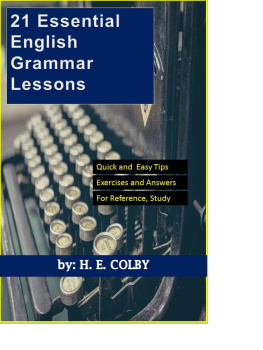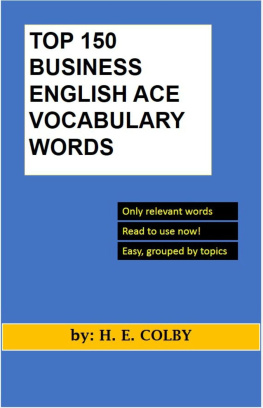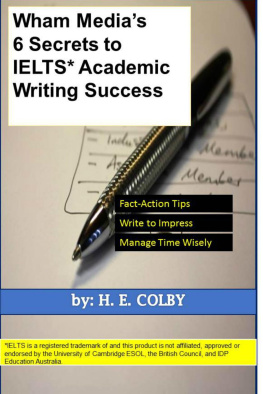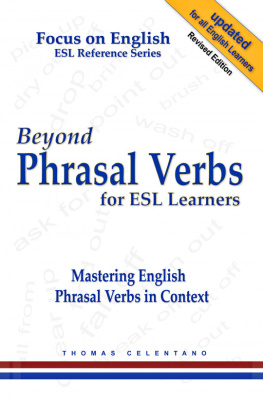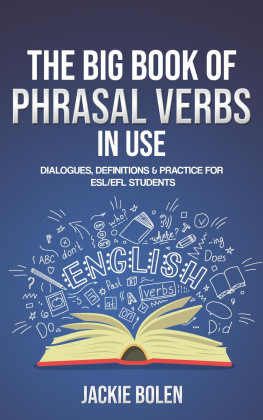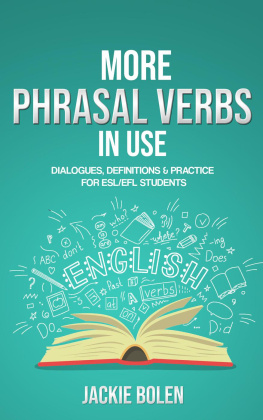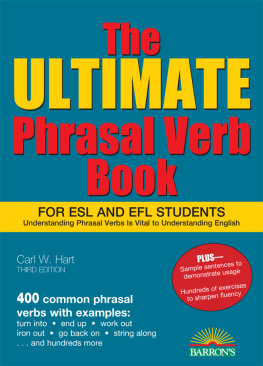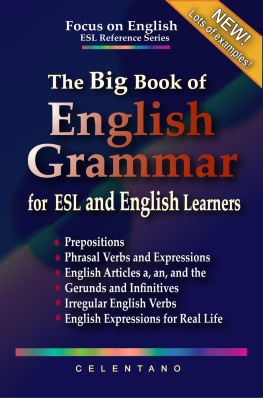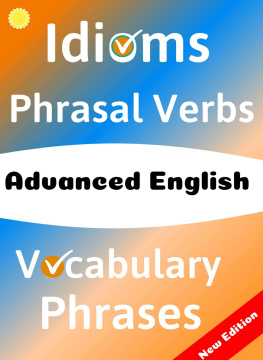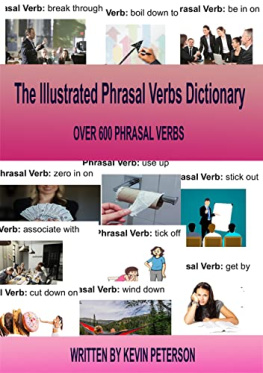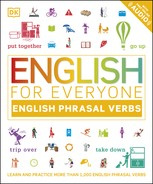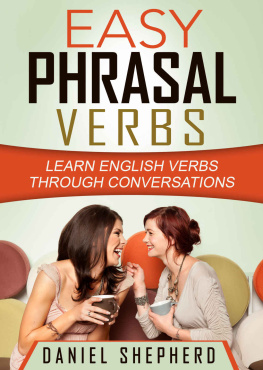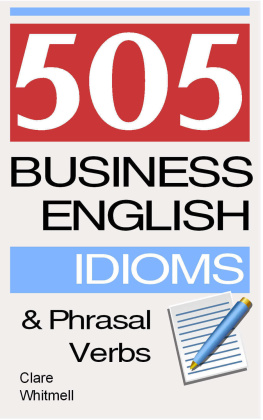150 Useful English Collocations, Idioms, and Phrasal Verbs
H.E. Colby
Published by H.E. Colby, 2014.
While every precaution has been taken in the preparation of this book, the publisher assumes no responsibility for errors or omissions, or for damages resulting from the use of the information contained herein.
150 USEFUL ENGLISH COLLOCATIONS, IDIOMS, AND PHRASAL VERBS
First edition. July 13, 2014.
Copyright 2014 H.E. Colby.
Written by H.E. Colby.
10 9 8 7 6 5 4 3 2 1
To Noel, Alex, Heather, Melissa, and Winfield with love
Preface
W elcome to 150 Useful English Collocations, Idioms, and Phrasal Verbs !
Many professionals struggle with the three interesting word combinations in English: 1) collocations, 2) idioms, and 3) phrasal verbs. Yet, using these three types of word phrases is essential for truly dominating the English language as well as expressing yourself naturally and accurately. If your personal and/or professional success depends on confidently and fluently using English, then you need 150 Useful English Collocations, Idioms, and Phrasal Verbs !
Are you confused about idioms, collocations, and phrasal verbs? Do you have trouble remembering which phrasal verb is separable or non-separable?
Dont worry anymore!
You are going to learn highly useful 50 English collocations, idioms, and phrasal verbs. You could read a thick heavy book on each, but I know your time is too valuable!
In 150 Useful English Collocations, Idioms, and Phrasal Verbs , you get definitions for an idiom, a collocation, and the three different types of phrasal verbs, and definitions for each. In addition, you get quiz at the end of each chapter to test your understanding!
If you are ready to really speak English fluently and more native-like, using collocations, idioms, and phrasal verbs, you found the right book! Open 150 Useful English Collocations, Idioms, and Phrasal Verbs , take out a clean notebook, and prepare yourself to polish your English and impress those around you!
Good luck,
H. E. Colby , author of How to Adjust Your Business Writing to the 21st Century (audio e-course)
For more information about Business English Ace:
Visit my Website: www.businessenglishace.com
Follow on Twitter: @bizenglish_ace
Like Facebook: Business English Ace page
Follow on Google+: Business English Ace page
Introduction to Collocations
W hat is a collocation?
A collocation is a term used to describe common and regular word combinations in English. While these words that go together sound natural to native speakers, students of English often struggle to make sense of them. Fear no more!
You are going to learn 50 collocations to help you on English examinations, at the office, or everyday life while using English to communicate with others. Using collocations demonstrates your deep understanding of the language and culture. When you learn a language, you are immersed in that culture and you naturally learn more about its people.
Usage of collocations by native speakers is both common and predictable. In time, using this book, you too will be able to recognize collocations in texts, conversations with friends and colleagues, and while watching movies or listening to the radio. Study these 50 collocations every day and using collocations will become second nature.
How to study collocations
Learning collocations expands your English vocabulary. Not only can you communicate your ideas and thought more precisely, you can liven up your writing by adding collocations for variety. Vivid writing makes your arguments more compelling and therefore more persuasive. For example, instead of just writing disappointed, write instead bitterly disappointed to make your point finer and create an image in the mind of the reader.
Beyond this book, look for collocations in texts you read and in movies and newscasts. Write down the word combination and add it to a list. When you have a few number, create flash cards using either regular index cards or go to quizlet.com to create your own digital cards. Plus, you can also find other collocations from users there. Review the flash cards and then test yourself. Copy the sentence with the collocation or write your own! When we write down ideas in our own notes, we tend to remember them!
There are thousands of collocations. As your English studies progress, you will no doubt learn more. Make these word combinations a part of your vocabulary and use them naturally. The following 50 collocations are a great start. Get comfortable using these collocations and you will find it easier to learn others.
Types of Collocations
There are seven (7) main types of collocations. Be aware of these patterns and you will be able to readily notice collocations when used.
(1) Adjectives and Nouns: Notice which adjectives typically go with certain nouns.
Ex: best friend, chief complain, main issue
(2) Nouns and Verbs: Notice how certain nouns and verbs are found together.
Ex: The oil industry boomed in south Texas last year. (the industry was strong).
(3) Noun + Noun: Watch for collocations in this pattern a....of.....
Ex: Luis accepted Rolands advice with a grain of salt. (hardly accepted it at all!)
(4) Verbs and Expressions with Prepositions: Notice verbs and prepositions go together.
Ex: Myrna fell into despair when she failed her algebra test. (became sad)
(5) Adverbs and Adjectives: Some adjectives have particular adverbs that form collocations.
Ex: It was completely useless to argue with the boss over a pay raise. (worthless)
(6) Verbs and Adverbs: Some verbs have certain adverbs that form collocations.
Ex: The price of gold decreased considerably with a new discovery in Zambia. (the price fell a lot)
(7) Short Phrases with a Specific Word Order: Be aware of these types of combinations.
Ex: Jazmine was head and shoulders above the rest of the class with good grades.
50 Collocations
. to achieve success to obtain the desired result, wealth, fame, etc.
Ex: Lori achieved success by graduating from Stanford with honors.
2. bitterly disappointed very upset.
Ex: Roth was bitterly disappointed when he was not accepted at Yale.
3. booming economy a strong economy with a lot of prosperity.
Ex: Tax receipts sharply grew with the booming economy.
4. brand awareness extent to which a companys brand is known.
Ex: Albemare Fish Company concentrated its marketing on brand awareness.
5. break a leg expression of good luck.
Ex: Before Setti gave her speech, her boss told her to break a leg.
6. to break a promise to not do what you said you would do.
Ex: Nina broke a promise to take her baby sister skating on Saturday.
7. to break a record to destroy a previously set record by setting a new one.
Ex: Ahmed broke the record for time to run the 100 meter dash.
8. to break someones heart to cause great emotional pain and suffering.
Ex: Lola broke Ians heart when she went to the dance with Jared instead.
9. to break the ice to make unfamiliar people feel relaxed and at ease.
Ex: Our boss always breaks the ice by talking to clients about his children.
10. to break the law to commit an offense or fail to follow the law.
Ex: The accountant broke the law by transferring company funds into his own bank account.
11. to bring up the subject to introduce a topic in a conversation or meeting.
Ex: Josh brought up the subject of leaving work early on Friday at the morning meeting.
12. crucial role an important part of something.
Ex: A private detective played a crucial role in solving the mystery of the missing bank funds.


